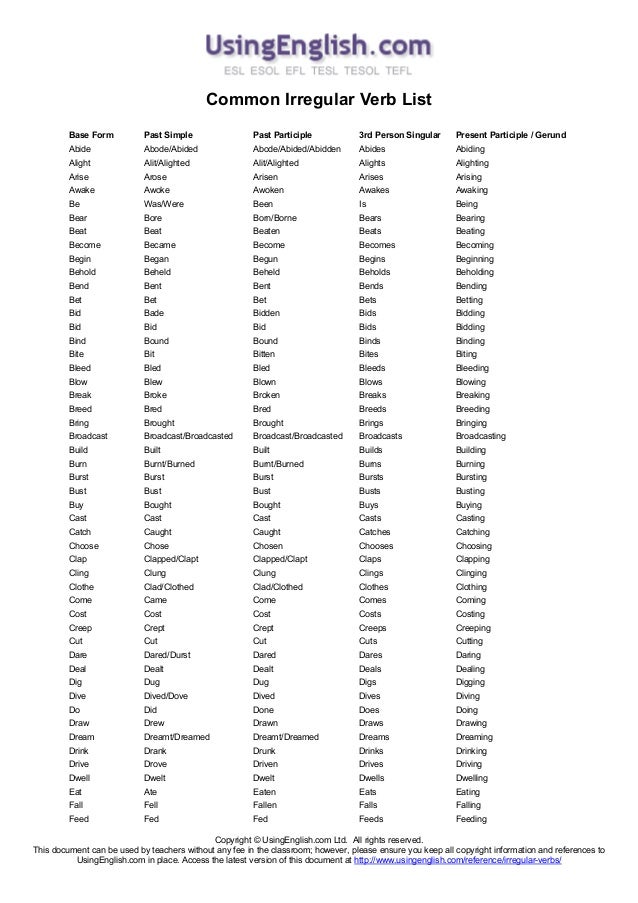


Inflected forms ( bewares, bewared, bewaring) are considered obsolete.īid – bid – bid outbid – outbid – outbid overbid – overbid – overbid rebid – rebid – rebid underbid – underbid – underbidīid – bid/bade – bid/biddenīind – bound – bound unbind – unbound – unbound Weak, class 1, subclass (ii), with Rückumlaut and Germanic spirant law (now regularized)īet – bet/betted – bet/betted underbet – underbet/underbetted – underbet/underbettedĭefective formed from be with predicate adjective, used as infinitive, imperative and subjunctive only. Weak, class 1, with coalescence of dentals and devoiced endingīeseech – beseeched/besought – beseeched/besought The spelling born is used in passive or adjectival contexts relating to birth.īeat – beat – beaten/beat browbeat – browbeat – browbeaten/browbeat overbeat – overbeat – overbeaten/overbeatīecome – became – become misbecome – misbecame – misbecomeīeget – begot/begat – begot/begotten misbeget – misbegot/misbegat – misbegotten/misbegotīend – bent – bent overbend – overbent – overbent unbend – unbent – unbent However, forleosan has fallen out of use and shave is now regular, so these verbs are not listed, and behold, while still irregular, can no longer be listed this participle form.īear – bore – borne/born forbear – forbore/forbare – forborne/forborn overbear – overbore/overbare – overborne/overborn underbear – underbore/underbare – underborne/underborn Most obviously, adjectives like clean-shaven, beholden, or forlorn fossilize what are originally the past participles of the verbs shave and behold, and Old English forleosan. Modern English still has remnants of formerly irregular verbs in other parts of speech. There are also many thousands of archaic, non-standard and dialect variants.

This list only contains verb forms which are listed in the major dictionaries as being standard usage in modern English. English irregular verbs are now a closed group, which means that newly formed verbs are always regular and do not adopt any of the irregular patterns. build, bend, send), stem changes (whether it is a vowel, such as in sit, win or hold, or a consonant, such as in teach and seek, that changes), or adding the suffix to the past participle form (e.g. The preterite and past participle forms of irregular verbs follow certain patterns. He burnt his finger.), and in American English, the regular form is associated with the literal sense of a verb, while the irregular form with a figurative one. It is also worth noting that the irregular form tends to indicate duration, whereas the regular form often describes a short-term action ( The fire burned for weeks. Australian, New Zealand and South African English tend to follow the British practice, while Canadian English often sides with the American usage. spilled), American English normally uses the regular form, while British English tends to favor the irregular. Sometimes the usage depends on the dialect. In the table, the preferred or more common usage is generally listed first, though for some words the usage is nearly equal for the two choices. In some cases, there are two or more possibilities for a given form. Information about the development of these verbs generally can be found at English irregular verbs details of the etymology and usage of specific verbs can be found by consulting Wiktionary. The right-hand column notes whether the verb is weak or strong and whether it belongs to a subclass, and links to descriptions elsewhere. In English, these are used as verbs, adjectives, and nouns.) In the case of modal verbs the present and preterite forms are listed, since these are the only forms that exist with the present form identical for all persons. (The present participle and gerund forms of verbs, ending in -ing, are always regular. If there are irregular present tense forms (see below), these are given in parentheses after the infinitive. This is followed by the simple past tense ( preterite), and then the past participle. For each verb listed, the citation form (the bare infinitive) is given first, with a link to the relevant Wiktionary entry.


 0 kommentar(er)
0 kommentar(er)
